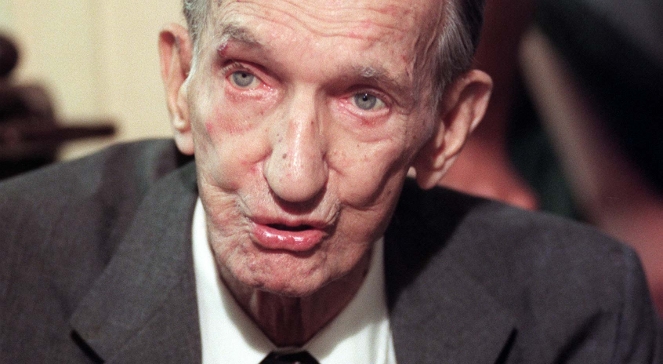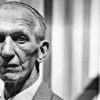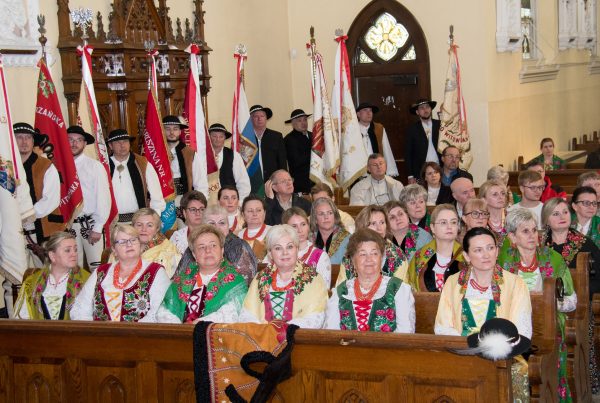Reflections by Thaddeus C. Radzilowski, Ph.D.
I had the honor to know Jan Karski. I spent a good part of a week with him in the late 1980’s taking him around to colleges in Minnesota on a lecture tour I had arranged for him. I had a chance to hear him deliver his message to one audience of college students after another and then afterward to discuss each lecture at local campus bars. It was a fascinating time for me. He had long been a hero. I met him in Washington a few years earlier when I was on leave from my university to serve as special assistant to the chair of the National Endowment. Even earlier, as a sophomore in college I found his book, The Story of a Secret State in a used bookstore. Once I started it I couldn’t put it down. I have reread it many times since and given away more than a dozen other copies I bought at other used book stores and garage sales.
Although I cannot say that I knew him well, I learned early on in our acquaintanceship that he did not have feet of clay. He was indeed a hero… the real thing. He was a reserved, pensive and very complex man. He seemed to be living simultaneously in two separate worlds. Sometimes, before or after a lecture I would lose him as he thought about what he had seen in those terrible times. Yet he was also a very charming companion and an engaging raconteur with a subtle sense of humor. You didn’t have to know him long before he found occasion to explain that his family, the Kozielewskis, had no claim to gentry status. They were a middle class Łodż family. Yet everything in his manner bespoke noble status. He loved tailor made suits and shirts and wore them well. He enjoyed fine cuisine and drank his evening Manhattan with a sense of connoisseurship and ceremony. It was like watching a sacred ritual. And no one ever smoked a cigarette more aristocratically than did Jan Karski. Part of this manner came from his diplomatic training and career but clearly much of it was natural to him. He was a natural aristocrat. Yet he never, ever claimed to be a hero, although he joked about having been forced to become one by his handlers for public consumption. He was consistently modest and self-effacing. He always told someone else’s story, never his own. Never did the messenger upstage the message.
He also recognized that the exploits for which people lauded him were made possible only by the work and sacrifices of many, some of whom paid the ultimate price. It was with a deep sense of tragedy that he recounted that his escape from Nazi captivity after excruciating torture cost more than 30 people their lives. Some of them he had personally drawn into the affair. Many of them were killed only after long, terrible tortures at the hands of the Gestapo.
Jan Karski, like his slightly younger contemporary Karol Wojtyla, was raised in the newly independent Poland born of the First World War. His family milieu, like Wojtyla’s, was intensely Catholic, conservative, immensely patriotic and philo-semitic. Some of his close childhood friends were Jewish. He was part of a group of largely Jewish students in high school and had Jewish friends at the university. Yet he did not, to his later deep regret, engage himself actively in combating anti-Semitism in the 1930s, unlike his dear friend Jan Jerzy Lerski who shared the same philo-semitic Catholic background. Lerski fought in the streets against anti-Semitic things. “I did not want to get involved,” he confessed later. Perhaps that regret moved him to act as he did later.
Lerski who also performed heroically in the war, later became a leading figure in American Polonia and an activist in Polish-Jewish relations. Like Karski he was also a courier, in his case for SOE, who later in the war actually briefed Churchill on the situation of the Jews in Poland. Karski was never able to see Churchill. Like Karski, he too was named a righteous among nations by Yad Vashem.
As the war progressed, Karski became more and more alarmed at the murderous treatment of Jews by the Nazis as the final solution began to take shape in 1941. He was also dismayed by the indifference to the plight of Poland’s Jews and even hostility and betrayal by some segments of the Polish population. Between his escape after his ill fated second mission and his final trip to the West, Karski became active in Żegota, the organization founded by the Home Army to rescue Jews, and was personally involved in actual rescue operations.
In preparation for his last mission, he made his famous visits to the Ghetto and to a transit center for Belzec: Izbica Lubelska and held meetings with Jewish leaders. He committed all he saw, heard and smelled to his extraordinary memory. The visits physically sickened him. It took days to return to some equilibrium after the trips to the Ghetto and to the camp. He was to remember it vividly all of his life. He could not forget.
Despite the deep and permanent psychic wounds his experiences in the Ghetto and in the transit camp inflicted on him, Karski’s great strength and his effectiveness as a speaker was that he reported only the facts, as he knew them as dispassionately as he could despite the wrenching pain and nausea he felt. His reports were not tailored to his audience even if he knew that they would dismay his listeners, both his Jewish and Catholic countrymen he felt. He once said “my character is solely that of a courier. I am not entitled to explain, to clarify, or to analyze…”
Beside the information on the emerging Holocaust, on his last mission he also carried reports on the Soviet efforts to defame, disorganize and destroy the Polish underground in anticipation of a postwar takeover. In neither case was he successful in raising the alarm sufficiently to move the West to action to end the Holocaust or to save Poland.
After the war, embittered by his failure to stop or even slow down the Holocaust, he later said, “I hated humanity. I broke with the world…I imposed on myself a pledge never to mention the war to anyone”.
Beside the teaching career he took up, he devoted himself instead to the struggle against communism. He became so successful and effective a speaker that the State Department sent him on several worldwide speaking tours.
Only after Claude Lanzmann succeeded in cajoling him into an interview for the film Shoah and the Middle East situation became more threatening for Israel in the late seventies, did he reconsider his decision not to talk about what he had seen and experienced. He realized that there were too many who were beginning to forget and there was a generation that did not even know. He was especially shocked by Holocaust denial. His first major speech was at a conference put together in 1981 by Elie Wiesel and the Holocaust Memorial Museum.
His closing remarks are well worth noting:
“The Lord assigned me a role to speak and write during the war, when – as it seemed to me – it might help. It did not.
Furthermore, when the war came to its end, I learned that the governments, the leaders, the scholars, the writers did not know what had been happening to the Jews. They were taken by surprise. The murder of six million innocents was a secret…
Then I became a Jew. Like the family of my wife – all of them perished in the ghettoes, in the concentration camps, in the gas chambers – so all murdered Jews became my family.
But I am a Christian Jew. I am a practicing Catholic. Although I am not a heretic, still my faith tells me the second Original Sin has been committed by humanity: through commission, or omission – self-imposed ignorance, or insensitivity, or self-interest, or hypocrisy or heartless rationalization.
This sin will haunt humanity to the end of time.
It does haunt me. And I want it to be so.”
He returned again to his role as a messenger for almost another decade. He spoke again for those who had been murdered and for those still living who were victims of the Shoah.
He told the story to the world as he had been ordained to do until he could no longer do so. Perhaps, even if he could not save those who sent him, he might save others in the future. Jan Karski remained the faithful messenger to the end.
Photo credit: PAP
Source: The Archives of Tygodnik Polski/Polish Weekly, April 2014.









